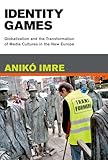Identity Games: Globalization and the Transformation of Media Cultures in the New Europe
Material type: TextPublication details: London : The MIT Press, 2009.Edition: 1st edDescription: 267 p. ; 15.88 x 23.5 cmISBN:
TextPublication details: London : The MIT Press, 2009.Edition: 1st edDescription: 267 p. ; 15.88 x 23.5 cmISBN: - 9780262090452
- 302.230 IMR
| Item type | Current library | Collection | Call number | Status | Barcode | |
|---|---|---|---|---|---|---|
 Book
Book
|
Air University Multan Campus Library Social Science Basement Floor | General books | 302.230 IMR (Browse shelf(Opens below)) | Available | P000395 |
Browsing Air University Multan Campus Library shelves, Shelving location: Social Science Basement Floor, Collection: General books Close shelf browser (Hides shelf browser)
Eastern Europe's historically unprecedented and accelerated transition from late communism to late capitalism, coupled with media globalization, set in motion a scramble for cultural identity and a struggle over access to and control over media technologies. In Identity Games, Anikó Imre examines the corporate transformation of the postcommunist media landscape in Eastern Europe. Avoiding both uncritical techno-euphoria and nostalgic projections of a simpler, better media world under communism, Imre argues that the demise of Soviet-style regimes and the transition of postcommunist nation-states to transnational capitalism has crucial implications for understanding the relationships among nationalism, media globalization, and identity. Imre analyzes situations in which anxieties arise about the encroachment of global entertainment media and its new technologies on national culture, examining the rich aesthetic hybrids that have grown from the transitional postcommunist terrain. She investigates the gaps and continuities between the last communist and first post-communist generations in education, tourism, and children's media culture, the racial and class politics of music entertainment (including Roma Rap and Idol television talent shows), and mediated reconfigurations of gender and sexuality (including playful lesbian media activism and masculinity in "carnivalistic" post-Yugoslav film). Throughout, Imre uses the concepts of play and games as metaphorical and theoretical tools to explain the process of cultural change -- inspired in part by the increasing "ludification" of the global media environment and the emerging engagement with play across scholarly disciplines. In the vision that Imre offers, political and cultural participation are seen as games whose rules are permanently open to negotiation.
There are no comments on this title.




